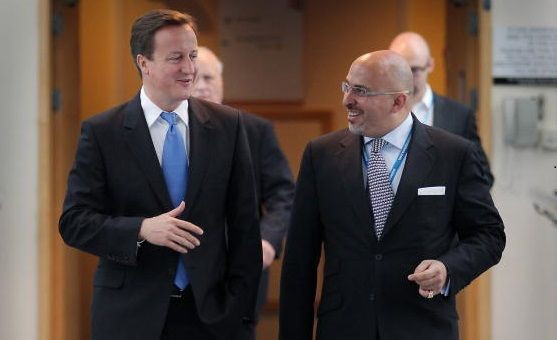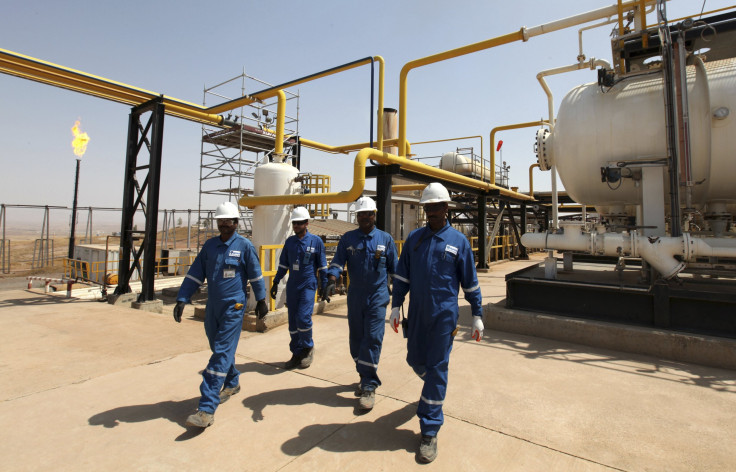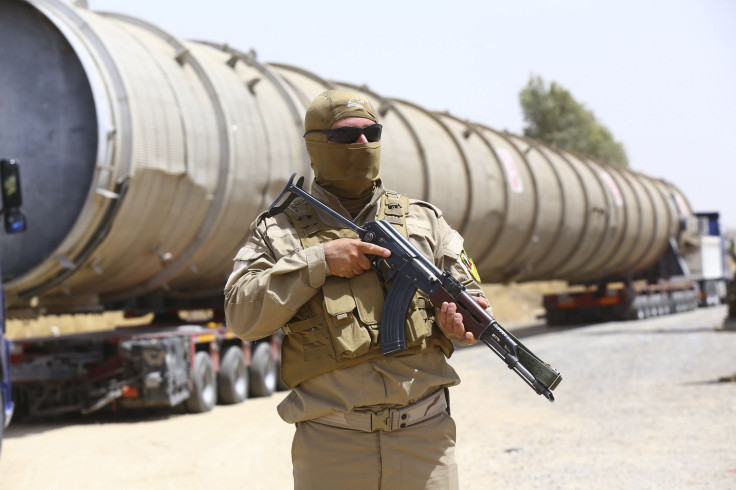British Politician Earns Massive Salary From Oil Company As Local Iraqis Suffer Economic Downfall

Each morning in Iraqi Kurdistan, civil servants go to their government offices or military outposts, and each evening they come home with no money to show for their work. They haven’t been paid in months. Still, they return to their workplaces day after day in the hope that the local economy will begin to show the growth that many government officials promised when foreign oil investors first came to the region more than 10 years ago.
During the U.S. invasion of Iraq, energy companies from around the world flocked to Iraqi Kurdistan to grab a piece of the previously untapped massive oil reserves. At the time, officials from the region and around the world touted the investment as a positive step forward for the Iraqi Kurds. The operations would bring jobs, they said, and would allow the region to finally crawl out from under Baghdad’s grip and move toward independence.
Now that scenario looks even less likely — even though the energy companies have been operating and exporting at increasing levels for years. The outlook for the economy in Iraqi Kurdistan today is bleak. The region, which relies predominantly on the oil sector, is now facing decreased production because of the fight against the Islamic State group. Pipelines have been attacked, and energy companies have pulled their staff out of the region. Low oil prices are also hurting the economy.
“I only have 5,000 dinars [$4.50] until I get my next paycheck,” Mohammed Ali Asked, a 25-year-old arts teacher in Kirkuk, told International Business Times in January. “Lots of people have divorced because of not getting paid, and I am afraid my situation is going to be like that. The situation is not suitable for marriage here. I can’t afford a family. If [my] wife asks for something, I can’t pay for it.”
While the people of Iraqi Kurdistan are suffering to make ends meet, oil executives who operate in the region and government officials in the Kurdish Regional Government (KRG) are profiting lavishly, according to government documents obtained by IBT. Executives at oil companies that have strong connections to the government stand to earn even more than those who do not. Nadhim Zahawi, a British Conservative Party politician who is a member of Parliament for Stratford-on-Avon, is one of those people.

Zahawi is the chief strategy officer of Gulf Keystone Petroleum (GKP), an oil company that operates in Iraqi Kurdistan. He earns $500,000 a year for working 7 hours a month in addition to the salary he makes as a member of Parliament. So far this year Zahawi has received two bonuses totaling more than $29,500. According to the documents obtained by IBT, his bonus payments coincided with the KRG receiving oil payments.
Zahawi’s story illustrates a larger structural problem in the oil sector in Iraqi Kurdistan. Executives of the oil companies that operate in the region work behind the scenes on behalf of KRG officials, but the people of the region do not receive the benefit of those connections, according to a monthlong study by IBT.
Emails obtained by IBT show the Kurdish government, specifically the Ministry of Natural Resources, has a track record when it comes to picking potential investors. The Kurdish officials, specifically Prime Minister Masoud Barzani, invite potential clients to the region to scope out new projects. The government strikes deals with those clients before announcing the partnership or registering it publicly, with caveats that are never declared in official documents.
Zahawi was appointed to his position in GKP because of his connections to Iraqi Kurdistan, according to a board member who asked to remain anonymous because he was not authorized to speak on the matter.
At 9 years old, Zahawi and his Kurdish parents fled Iraq to the U.K. as the crackdown on the Kurdish people intensified under Saddam Hussein. He attended private schools and received a degree in chemical engineering at University College London. Zahawi went on to the business world, co-founded the polling company YouGov, but always maintained his ties to Iraqi Kurdistan.
Over the past five years, Zahawi has visited the region several times and appeared on panels with Ashti Hawrami, the minister of natural resources in the KRG, who has been under investigation for alleged insider trading and corruption in Iraq. The KRG paid thousands of dollars for Zahawi's flights to the region and his accommodations.
He also heads the All Party Parliamentary Group for Kurdistan, which is supposed to "encourage the development of democratic institutions in the Kurdistan Region as part of the democratic and federal process in the wider Iraq.”
Zahawi was appointed to Gulf Keystone in 2015 after serving as an adviser for another oil company, Afren, which went bankrupt. But the parliamentarian did not disclose his position in the company until several weeks after he took office, which is against the law. A U.K. MP by law has to register his interests within 28 days.
Gulf Keystone Petroleum was one of dozens of energy companies to come onto the scene in Iraqi Kurdistan following the U.S. invasion. The previously untapped oil and gas reserves in the semiautonomous region of Iraq provided energy companies with an opportunity to invest in a potential boom market. For Kurds in Iraqi Kurdistan, investment from the outside provided the hope for a better life.
Now, though, that dream has been deferred. The KRG is having trouble paying the international oil companies operating in the region, the people of Iraqi Kurdistan are out of work or are not being paid, and the oil companies themselves are suffering.
GKP, for example, is in big trouble financially. The company's share price has tanked, its boardroom members are at odds with one another, and the company has failed to repay its bondholders. The company no longer holds as much of a stake in Iraqi Kurdistan as it used to. In fact, the KRG has taken back control of one of the largest oil-producing fields in the region.
The situation could have been remedied this past year via arbitration, the board member told IBT, but Zahawi advised against it.

The company began discussions last year to put itself up for sale, saying the KRG had not paid more than $100 million that it owed for exports. Dana Gas, a United Arab Emirates-based company, recently took the KRG to court over the matter and won. Executives at GKP considered arbitration but decided against it after Zahawi advised the company to try to restructure its debt. Through Zahawi's advisement, the KRG has been able to avoid arbitration and delay paying GKP — a win for Hawrami.
If the KRG avoids arbitration and can at the same time avoid paying the hundreds of millions of dollars it owes GKP, Zahawi could get a bonus as he has in the past. Meanwhile, members of the Kurdish military, also known as the peshmerga, are not being paid despite their responsibility for fighting the Islamic State group, also known as ISIS.
Now the oil company is technically in default. It announced this month that it would need to extend the deadline to pay back $26 million to bondholders, which it plans to do early next week. The Shaikan wells in Kurdistan, operated by Gulf Keystone and MOL Hungarian Oil & Gas, need $71 million in investment to maintain current production levels of 40,000 barrels a day. The Kurdish government still owes GKP about $298 million, though the paperwork stating the outstanding payment was never filed to the London Stock Exchange as required by law.
Executives of the company say they are confident that GKP will be able to make a comeback, but bondholders are already preparing a plan that would swap some debt into equity to take control of the company, sources close to the discussions told IBT.
“We are working to achieve the best possible way to restructure our balance sheet. Addressing our funding needs will ensure the company’s longer-term future and ability to continue developing the Shaikan field for the benefit of all our stakeholders,” CEO Jerry Ferrier said in a statement. The company has more than 35,000 shareholders, many of whom are retail investors. It is incorporated in Bermuda but is listed on the London Stock Exchange.
Bondholders, some who come from places such as the KRG, UAE and U.K., have been shorting the company's stock, which is driving the price down. The shorts are held by two financial houses. If GKP does not pay the $26 million in bond interest, the bondholders will take control of the company's assets.
As the chaos in GKP plays out in the boardroom, the Iraqi Kurds are still no closer to seeing the revenue from oil investment. Meanwhile, the central government in Baghdad is struggling to appoint a new cabinet while also calming protests in the streets.
CORRECTION: Zahawi works between 8 and 21 hours a week in his role as chief strategy officer for Gulf Keystone Petroleum (GKP) and earns $349,000 a year, not including bonuses, according to Parliament documents. A previous version of this article stated otherwise. He also earns about $107,000 for his role as a member of parliament. In addition, GKP did file paperwork to the London Stock Exchange disclosing that it was owed $298 million from the Kurdish Government.
© Copyright IBTimes 2024. All rights reserved.




















